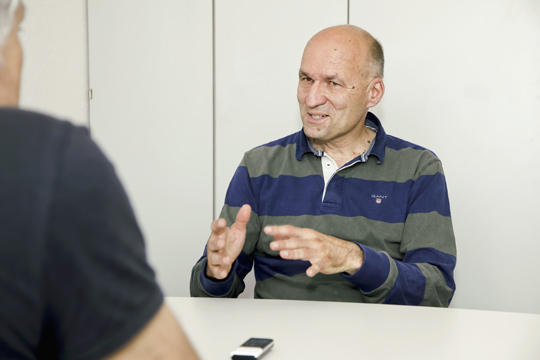A Pharmaceutical Alternative
Freiburg, Jul 02, 2018
Most students getting a pharmaceutical sciences degree plan to work preparing and dispensing prescriptions in future. Yet the pharmaceutical industry also presents a number of attractive opportunities that are of growing interest to more and more students. In order to prepare students for this career path, the Institute of Pharmaceutical Sciences of the University of Freiburg is offering the new "Regulatory Affairs and Drug Development" elective track within its Master’s program in the winter semester of 2018/2019. Jürgen Reuß spoke with the responsible teacher Prof. Dr. Andreas Bechthold to find out what the program is all about.
 Photo: kenary820/Fotolia
Photo: kenary820/Fotolia
Mr. Bechthold, what motivated you to offer the new Master’s elective track?
Andreas Bechthold: That’s quite a long story. For five years now, we’ve been giving industrial companies an opportunity to introduce themselves within the scope of a lecture series. That gives students a chance to learn more about what it’s like to work in the pharmaceutical industry and what qualifications they require. A common interest in closer cooperation on the part of the university and industry grew out of that. Particularly when it comes to the area “Regulatory Affairs and Drug Development” – or the process of developing a drug until it is approved for market – the university must rely on expertise from outside, while industry is searching for people who are academically trained in the field. During our talks it emerged that many small and medium-sized enterprises, but major companies, too, like Hoffmann-La Roche, were actually prepared to take on a major part of the teaching.
Students can therefore tailor their Master’s to what they’ll be doing in practice?
Yes, but not solely relative to what the companies have to offer. We will also include areas like public relations. The students will learn how to prepare information for the media and work with journalists. The legal faculty will introduce the legislative aspects and ethical questions will be explored so that the entire complex of issues related to the approval of a new medicine is covered. But the most important insight is actually looking at daily work routine at a drug company. The duties of someone working for a large corporation such as Roche would differ greatly to those of someone working at a small firm, for example.
Would you like to orient the Master’s more towards industrial concerns?
What’s most important to us is to open up as many different career paths to students as possible and present the work that awaits them there as clearly as can be. A apart from that, a scientific education remains the basis for it all. But if some students don’t want to work as pharmacists after completing their degrees, based on their university education they should be able to opt for working instead as a "Regulatory Affairs Manager," perhaps.
 Andreas Bechthold is certain that the new elective track will provide scientific training and a look at daily working routines at drug companies.
Andreas Bechthold is certain that the new elective track will provide scientific training and a look at daily working routines at drug companies.
Photo: Ingeborg F. Lehmann
What is the core of the new elective track?
That students learn how drugs are developed and approved. In the pharmaceutical industry, this process actually begins ahead of the actual drug research, because ethical, regulatory, and other processes must be thought out very early on. Our aim is to examine this complex field.
But isn’t profit always industry's first priority?
Financial interest is legitimate and necessary, whereas my experience up to now shows that companies aren’t solely motivated by short-term profits. Instead, they definitely consider things from a sustainable standpoint as well. And even in that regard, for example, we have a woman who’s an expert and can use actual cases to show how the decision was made to develop a certain medicine and how things went on from there.
Won’t a strong orientation towards company wishes compromise scientific university education?
I don’t see any danger there, because at the university it’s about very basic education with respect to drug development. The industry, on the other hand, wants to find out if there is someone among the students that could fit in at their own company. For the students, that brings with it the advantage that they could do their Master’s work in a company that might employ them later on.
Who can take part in this elective track?
Our Master’s students first and foremost, who already have a Bachelor’s in pharmacy. But students of biology, biotechnology or chemistry are also eligible to register in the Master’s program. People from outside of pharmaceutical sciences might need to obtain a few additional qualifications but in principle, they may take advantage of the course offering. Qualified pharmacists who’ve passed their state examination are also eligible if they are interested in getting a Master’s degree.
Institute of Pharmaceutical Sciences

